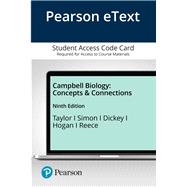A conceptual framework for understanding the world of biology.
Intended for non-majors or mixed biology courses.
Pearson eText is an easy-to-use digital textbook that instructors can assign for their course. The mobile app lets you keep on learning, no matter where your day takes you — even when you're offline. You can also add highlights, bookmarks, and notes in your Pearson eText to study how you like.
NOTE: You are purchasing an access card only. Pearson eText is a fully digital delivery of Pearson content. Before purchasing, check with your instructor to confirm the correct ISBN. To register for and use Pearson eText, you may also need a course invite link, which your instructor will provide. Follow the instructions provided on the access card to learn more.








